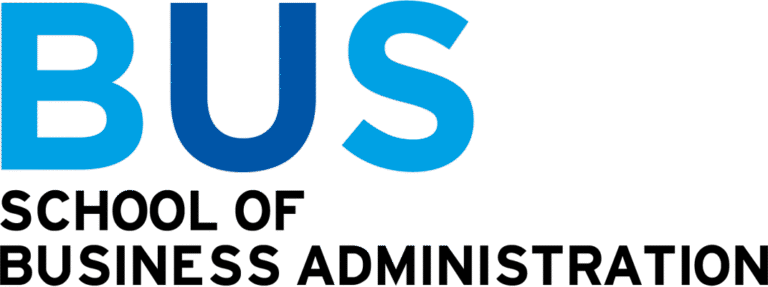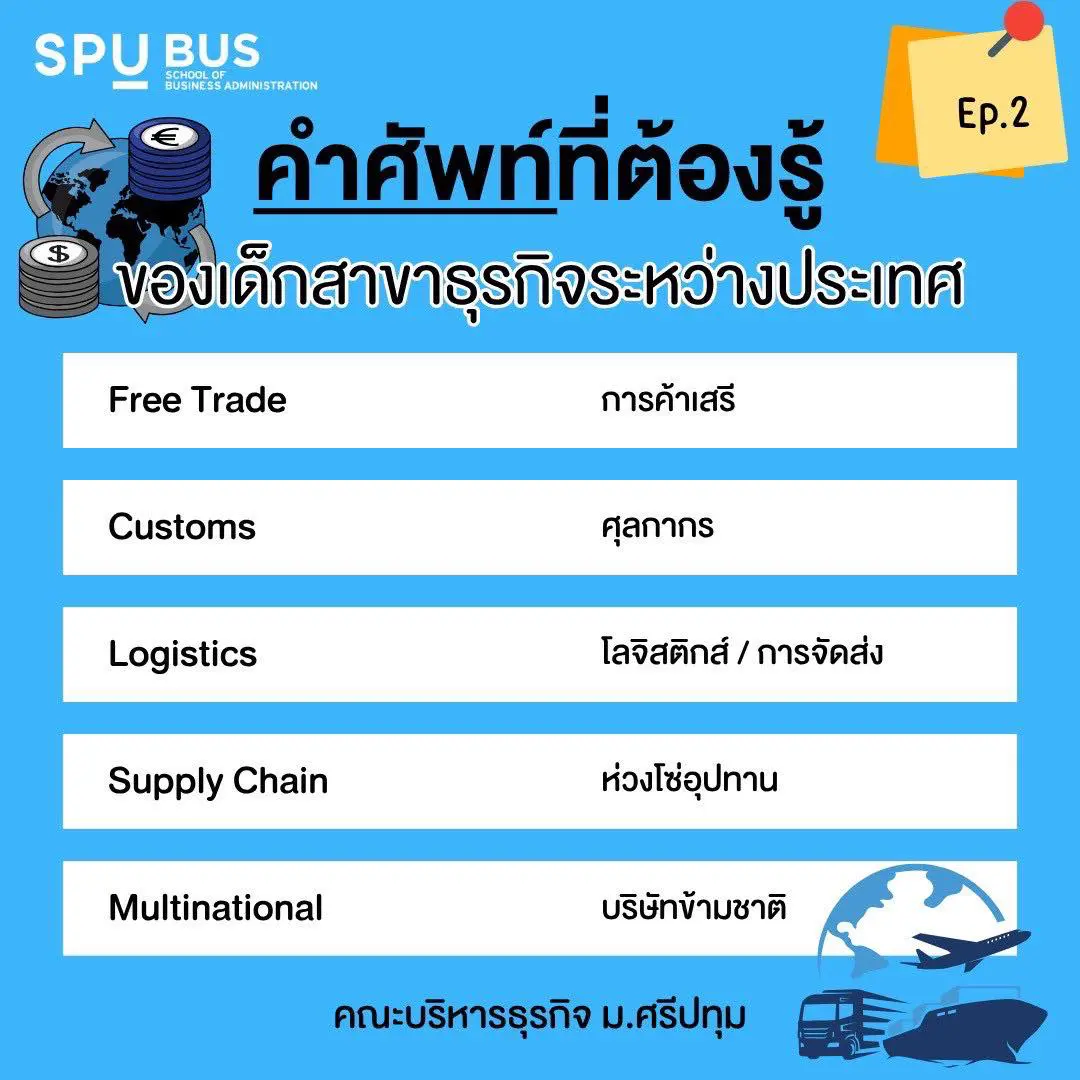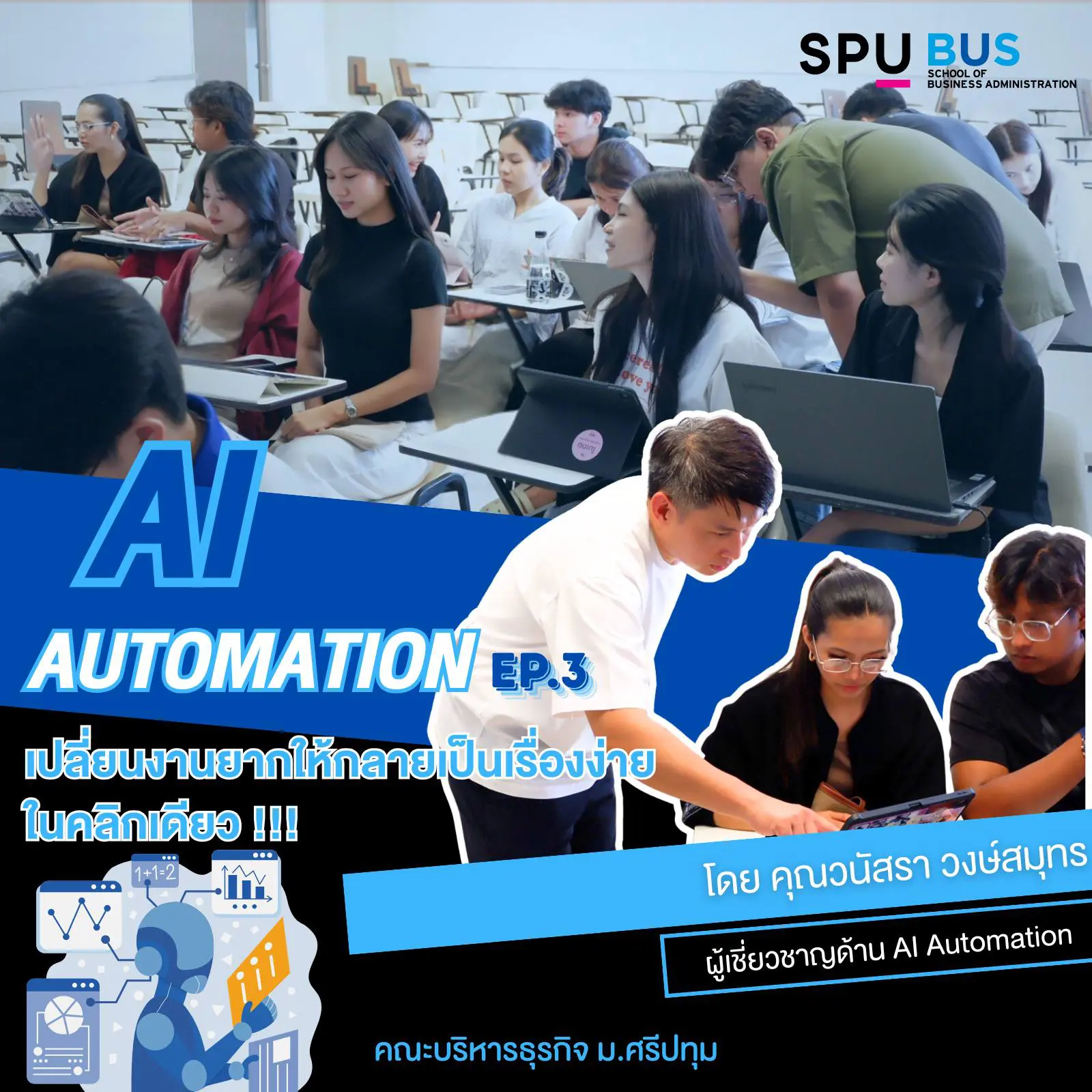อนาคตของการทำธุรกิจระหว่างประเทศในยุคเศรษฐกิจโลกผันผวน ปี 2025
สำหรับผู้ที่กำลังมองหาอนาคต หรือผู้ที่มีความตั้งใจจะก้าวเข้าสู่เวทีระดับสากล ย่อมตระหนักได้ว่าโลกในปัจจุบันมีการเปลี่ยนแปลงอย่างรวดเร็วและต่อเนื่อง ไม่ว่าจะเป็นสงครามการค้า การแพร่ระบาดของโรค หรือแม้แต่เทคโนโลยีปัญญาประดิษฐ์ (AI) ที่เข้ามาปรับเปลี่ยนรูปแบบธุรกิจในทุกมิติ ความไม่แน่นอนจึงกลายเป็นสิ่งที่แน่นอนที่สุด โดยเฉพาะในบริบทของธุรกิจระหว่างประเทศ ซึ่งเปรียบได้กับเส้นเลือดใหญ่ของระบบเศรษฐกิจโลก
อย่างไรก็ตาม ภายใต้ความท้าทายย่อมมีโอกาสแฝงอยู่เสมอ ความผันผวนคือสนามที่เปิดโอกาสให้ผู้ประกอบการซึ่งพร้อมปรับตัว เรียนรู้ และคว้าโอกาส สามารถสร้างความได้เปรียบเหนือผู้อื่นได้ โดยเฉพาะในปี 2025 ผู้ที่มีความพร้อมทั้งด้านความรู้ ทักษะ และเครื่องมือที่เหมาะสม ย่อมเป็นผู้ครองความสำเร็จในธุรกิจนำเข้า–ส่งออกและกิจการระดับนานาชาติ
คณะบริหารธุรกิจ มหาวิทยาลัยศรีปทุม (SPUBUS) จึงมุ่งมั่นที่จะถ่ายทอดองค์ความรู้และทักษะที่จำเป็น เพื่อเตรียมผู้เรียนให้สามารถ “อยู่รอดและเติบโต” ได้อย่างมั่นคงในเวทีธุรกิจโลก
ทำไมโลกธุรกิจปี 2025 จึงเต็มไปด้วยความท้าทาย?
ก่อนจะวางแผนรับมือ จำเป็นต้องทำความเข้าใจถึงปัจจัยสำคัญที่สร้างความเปลี่ยนแปลงให้กับระบบธุรกิจระหว่างประเทศ ดังนี้
-
ภูมิรัฐศาสตร์โลก (Geopolitics)
ความขัดแย้งระหว่างประเทศมหาอำนาจ การตั้งกำแพงภาษี และการแบ่งขั้วทางเศรษฐกิจ ส่งผลโดยตรงต่อการค้าระหว่างประเทศ ผู้ประกอบการจึงจำเป็นต้องวางแผนธุรกิจบนพื้นฐานของการเมืองโลก รวมทั้งพิจารณาความมั่นคงของคู่ค้าในเชิงยุทธศาสตร์ -
การปฏิวัติทางเทคโนโลยี (Technological Disruption)
เทคโนโลยีอย่าง AI, Blockchain, IoT และ Big Data กำลังเข้ามามีบทบาทสำคัญ เช่น การพยากรณ์ตลาดโลก การบริหารคลังสินค้าอัจฉริยะ การติดตามการขนส่งอย่างโปร่งใส รวมถึงการทำธุรกรรมข้ามพรมแดนที่ปลอดภัยและรวดเร็วขึ้น -
ความยั่งยืนและ ESG (Sustainability & ESG)
ผู้บริโภคยุคใหม่ให้ความสำคัญกับผลกระทบต่อสิ่งแวดล้อม สังคม และธรรมาภิบาล (Environmental, Social, and Governance) ธุรกิจจึงต้องปรับกระบวนการผลิตและห่วงโซ่อุปทานให้เป็นมิตรกับสิ่งแวดล้อม เพื่อรักษาความเชื่อมั่นจากผู้บริโภคและนักลงทุน -
ความทนทานของซัพพลายเชน (Resilient Supply Chain)
ประสบการณ์จากวิกฤตโควิด-19 ทำให้โลกธุรกิจตระหนักถึงความเสี่ยงของการพึ่งพาเพียงแหล่งผลิตเดียว แนวคิด “Just-in-Time” ถูกแทนที่ด้วย “Just-in-Case” พร้อมกับการกระจายความเสี่ยงและใช้เทคโนโลยีในการบริหารจัดการซัพพลายเชนอย่างมีประสิทธิภาพ
ทักษะที่จำเป็นสำหรับผู้ประกอบการธุรกิจระหว่างประเทศในปี 2025
เพื่อก้าวผ่านความท้าทายดังกล่าว บุคลากรในสายงานธุรกิจระหว่างประเทศจำเป็นต้องมีทักษะสำคัญ ดังนี้
-
Digital Literacy & Data Analytics: ความสามารถในการใช้ข้อมูลขนาดใหญ่เพื่อการตัดสินใจเชิงกลยุทธ์
-
Cross-Cultural Communication: การสื่อสารข้ามวัฒนธรรมเพื่อสร้างความเข้าใจและความร่วมมือทางธุรกิจ
-
Agility & Adaptability: ความยืดหยุ่นในการปรับตัวต่อสถานการณ์ที่ไม่คาดคิด
-
Supply Chain Management 2.0: การจัดการห่วงโซ่อุปทานอย่างทันสมัยและยืดหยุ่น
-
Creativity & Problem-Solving: การคิดเชิงสร้างสรรค์เพื่อแก้ไขปัญหาใหม่ๆ ที่ซับซ้อน
คณะบริหารธุรกิจ มหาวิทยาลัยศรีปทุม: สร้างนักธุรกิจสากลตัวจริง
หลักสูตรธุรกิจระหว่างประเทศ ของ SPUBUS ได้รับการออกแบบให้สอดคล้องกับบริบทโลกที่เปลี่ยนแปลง โดยมีจุดเด่นดังนี้
-
เนื้อหาทันสมัย: อัปเดตเรื่องราวล่าสุด เช่น Digital Transformation, E-commerce ระหว่างประเทศ และการประยุกต์ใช้ AI
-
อาจารย์ผู้ทรงคุณวุฒิและมีประสบการณ์ตรง: ถ่ายทอดความรู้ผ่านกรณีศึกษาจริง
-
เครือข่ายพันธมิตรเข้มแข็ง: นักศึกษาได้รับโอกาสฝึกงานและสร้างเครือข่ายกับองค์กรทั้งในและต่างประเทศ
-
การเรียนรู้แบบลงมือทำ (Project-based Learning): ฝึกฝนทักษะจริงทั้งการวางแผนธุรกิจ การเจรจาการค้า และการทำงานร่วมกับนักศึกษาต่างชาติ
คำถามที่พบบ่อย (Q&A)
-
Q1: จบสาขาธุรกิจระหว่างประเทศ สามารถทำงานอะไรได้บ้าง?
A1: สามารถทำงานได้หลากหลาย ตั้งแต่งานนำเข้า–ส่งออก นักการตลาดระหว่างประเทศ นักวิเคราะห์ธุรกิจ ผู้เชี่ยวชาญด้านโลจิสติกส์ ตลอดจนการเป็นผู้ประกอบการระดับสากล -
Q2: หากไม่เก่งภาษาอังกฤษ สามารถเรียนได้หรือไม่?
A2: ภาษาอังกฤษถือเป็นทักษะสำคัญ แต่ที่ SPU มีการเสริมทักษะด้านภาษาอย่างต่อเนื่อง และเน้นการใช้จริงในบริบททางธุรกิจ -
Q3: หลักสูตรที่ SPUBUS แตกต่างจากที่อื่นอย่างไร?
A3: จุดแข็งคือปรัชญา “เรียนกับตัวจริง ประสบการณ์จริง” โดยมีหลักสูตรที่ทันสมัย อาจารย์ผู้เชี่ยวชาญ เครือข่ายพันธมิตร และการเรียนรู้จากการปฏิบัติจริง -
Q4: การนำเข้าส่งออกในอนาคตจะเปลี่ยนไปอย่างไรจากเทคโนโลยี?
A4: เทคโนโลยีดิจิทัลจะเข้ามามีบทบาทอย่างมาก ตั้งแต่ระบบ Paperless, IoT, Blockchain ไปจนถึง AI ที่ช่วยบริหารความเสี่ยงและค้นหาตลาดใหม่ๆ
บทสรุป
แม้โลกธุรกิจในปี 2025 และอนาคตจะเต็มไปด้วยความไม่แน่นอน แต่ก็เป็นเวทีแห่งโอกาสสำหรับผู้ที่พร้อมเรียนรู้และปรับตัว การเลือกเรียนสาขาธุรกิจระหว่างประเทศจึงเป็นการก้าวสู่บทบาทสำคัญในการขับเคลื่อนเศรษฐกิจโลก
คณะบริหารธุรกิจ มหาวิทยาลัยศรีปทุม พร้อมมอบทั้งความรู้และประสบการณ์จริง เพื่อเตรียมผู้เรียนให้พร้อมเป็นกำลังสำคัญของวงการธุรกิจสากลในอนาคต
“อนาคตอยู่ในมือของคุณ มาสร้างไปด้วยกันที่ SPUBUS!
________________________________________________________________________________________________________________________
The Future of International Business in the Era of Global Economic Volatility, 2025
For those who are looking toward the future, or anyone who wishes to step onto the global stage, have you ever felt that the world is spinning so fast nowadays? Trade wars, pandemics, and Artificial Intelligence (AI) that has come to change everything in a 360-degree way. It must be said that “the only certainty is uncertainty.” This is the truest statement in this era, especially in the field of international business, which is like the main artery of the global economy.
But wait! Do not lose hope just yet, because in every crisis there are always “opportunities” hidden within. Volatility itself is the playground for the real players! It is the stage for those who are ready to adapt, learn, and seize opportunities before anyone else. And in the coming year 2025, the one who holds the right weapons will be the winner in the arena of import-export and global business. Today, we will dive deep into what the future will look like and how we must prepare ourselves to “survive and thrive,” along with pointing you to a source of knowledge and practice that will shape you into a real professional in this field, namely the School of Business Administration, Sripatum University, or SPUBUS! If you are ready, let’s go!
Why is the world of business in 2025 so “turbulent”? Exploring the challenges ahead
Before looking at what must be done, let us first understand the “battlefield” we are facing, and why it is so challenging. This is not to scare you, but to help you prepare!
-
Global Geopolitics
Forget about the easy-going days of trade. We are now in an era where world powers are constantly in conflict. Trade wars, tariff barriers, and economic polarization directly affect import-export. Business planning now requires reading the political game, understanding how one country’s policy will impact our supply chain. Choosing partners is no longer just about price, but also about the political stability of that country. -
Technological Disruption like a lightning strike
AI, Blockchain, IoT, and Big Data are no longer words from sci-fi movies, but tools that are permanently changing the face of international business.
-
AI (Artificial Intelligence): Helps analyze global market data, forecast product demand, manage smart warehouses, and provide 24/7 customer service through chatbots.
-
Blockchain: Ensures highly transparent product tracking, reduces document forgery issues, and makes cross-border payments faster and more secure.
-
E-commerce & Digital Platforms: Anyone can now become an exporter through platforms like Amazon, Alibaba, or even TikTok Shop, which connect the entire world together. No need for large companies as in the past.
-
Sustainability & ESG trends – not just a choice, but survival
New-generation consumers no longer buy products simply because they are cheap or good; they want to know if the product harms the planet. How much does your company care about the environment, society, and governance (ESG)? This trend pressures businesses to make major adjustments—from sourcing eco-friendly materials, adopting low-carbon production processes, to ensuring employee welfare in the supply chain. Those who fail to adapt may easily be abandoned by customers and investors. -
Supply Chains that must be “tough and resilient” more than ever
The costly lessons from COVID-19 taught us how risky it is to depend on a single supplier. The “Just-in-Time” era is being replaced by “Just-in-Case.” Companies are diversifying sources of production and using technology to more precisely manage risks in their supply chains.
The skills you must have to survive and thrive in international business in 2025
Once we see the challenges, it is time to prepare our “weapons.” These are the skills that anyone working in international business in 2025 must possess, or else risk being swept away:
-
Digital Literacy & Data Analytics: Not just computer skills, but the ability to read and analyze Big Data trends to make sharp business decisions.
-
Cross-Cultural Communication: Not only English, but understanding cultural differences in negotiations, marketing, and building business relationships.
-
Agility & Adaptability: The ability to adjust and make quick decisions when faced with unexpected problems. The world spins fast; we must move faster.
-
Supply Chain Management 2.0: Knowledge of logistics, risk management, and the application of technology to create stronger and more flexible supply chains.
-
Creativity & Problem-Solving: When facing problems not found in textbooks, you must think creatively to find new solutions that keep the business moving forward.
Where can you find such “top-level” skills? The answer: SPUBUS
Reading up to this point, many may wonder: “So… where can I learn all of this?” Don’t worry! I have the treasure map for you—by studying at an institution that truly understands modern global business. And I confidently recommend the School of Business Administration, Sripatum University (SPUBUS), especially the International Business program. Here, they no longer teach in the traditional way!
Why is the International Business program at SPUBUS outstanding?
At SPU, there is a clear understanding that the world has changed. The curriculum is designed to address all the challenges we have just discussed. The standout philosophy is “Learning with Real Professionals, Gaining Real Experience.”
-
Updated content: Not just old textbook theories, but continuously refreshed with current business realities—Digital Transformation, international E-commerce, global digital marketing, and even AI applications for export analysis.
-
Faculty who are “real professionals” in the field: You will learn from instructors who are not only academics but also business owners, consultants for leading import-export firms, and marketers with real international experience. They bring real case studies and real problems for students to solve—a training ground before entering the real battlefield.
-
Strong connections: SPUBUS has powerful networks with both public and private organizations, such as the Department of International Trade Promotion, leading logistics companies, and many multinational corporations. Students get opportunities for company visits, internships, and networking before graduation.
-
Hands-on learning, not just lectures: Forget boring lecture-style classes. Here, the focus is on workshops and project-based learning. Students get to plan real export businesses, prepare shipping documents, and negotiate with international peers (through exchange programs). It is about turning classroom knowledge into practical skills.
Q&A: Clearing all doubts about International Business at SPUBUS
Q1: What careers can graduates of International Business pursue, besides import-export?
A1: Many! This field is far broader than you might think. Beyond import-export officers or starting a shipping company, career options include:
-
International Marketer
-
International Business Analyst
-
Overseas Purchasing Manager
-
Logistics & Supply Chain Specialist
-
International Trade Bank Officer (handling L/Cs and cross-border payments)
-
Commercial Diplomat or working in international organizations
-
And of course… becoming a “global entrepreneur.”
Q2: What if I’m not good at English—can I still study this field?
A2: Excellent question! English is indeed the “first gateway” to this field. However, at SPU, English foundations and skill development are continuously reinforced throughout the program. More importantly, the focus is on practical business use, allowing you to practice and improve faster than rote memorization.
Q3: How is studying at SPUBUS different from other universities?
A3: In summary, the key difference is the philosophy: “Learning with Real Professionals, Gaining Real Experience.”
-
Fresh and modern curriculum
-
Faculty with real-world expertise
-
Strong partner networks providing real opportunities
-
Hands-on, project-based learning
In short, SPUBUS doesn’t just “teach” you knowledge, but “shapes” you into a professional ready for the global business stage.
Q4: How will import-export evolve with technology in the future?
A4: It will change dramatically! The future of import-export will revolve around “Data & Digital.” Processes once paper-heavy will move to digital (Paperless); container tracking will be real-time through IoT; Blockchain will verify product origins and reduce fraud; AI will analyze new markets and manage risks. Future professionals in this field must therefore be technologically skilled—something emphasized strongly in SPU’s International Business program.
Conclusion: Your next step in the global business arena
The world of business in 2025 and beyond may seem daunting and filled with uncertainty, but it is also full of opportunities for those who never stop learning and adapting. Choosing International Business as your field of study means becoming part of the driving force of the global economy. Choosing the right institution is like choosing the “vehicle” that will take you swiftly and securely to your goals.
The School of Business Administration, Sripatum University (SPUBUS), is the answer for those who seek not only textbook knowledge but also real-world skills and experiences to compete in the global marketplace. Here, you will be equipped with the most modern intellectual weapons through “Learning with Real Professionals, Gaining Real Experience.”
Do not let the future depend on fate—create it with your own hands! If your heart beats faster at the thought of doing business with the world, don’t wait any longer. Your first step toward becoming an international business professional starts here!
The future is in your hands. Come build it together with us at SPU!
#SPUBUS #SPU #คณะบริหารธุรกิจ #สาขาธุรกิจระหว่างประเทศ #มหาวิทยาลัยศรีปทุม #dekspu #dek69 #เปลี่ยนฝันปั้นนักธุรกิจ



















